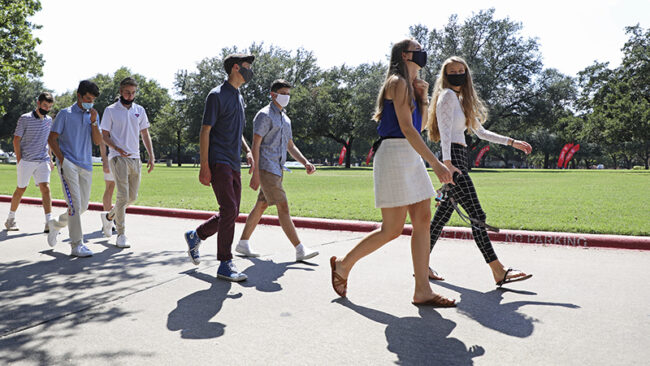By: Wade Glover
In the age of mask mandates and social distancing markers across campus, Student Foundation’s PerunaPalooza is a welcome reminder that the SMU community truly remains “Mustang Strong.”
Hundreds of students have checked in to the three-day birthday party for SMU’s mascot Peruna every night of the celebration, setting the bar high for future events in the midst of the pandemic. PerunaPalooza represents much more than just socially-distanced fun, it also presents an opportunity for the university to slow the spread of COVID-19 on campus.
SMU’s email to the campus community announcing the university is raising the fall operational level to “high” was very telling. The end of the email stated there is no data to suggest the virus is spreading on campus in significant locations including classrooms, residential commons, libraries, student organizations and events, and virtually every other location on the Hilltop.
What does this mean? Transmission is occurring at off-campus gatherings that are not necessarily subject to the same strict COVID guidelines as their on-campus counterparts.
In a way, it makes sense. Former first-years remember the anxiety and stress over finding a friend group. Imagine that feeling coupled with strict guidelines like the no-guest policy, virtual organization meetings, and generally reduced contact with people other than your roommate.
Incoming students have been denied the typical SMU experience and the friendships, memories, and growth that come with it. They think the only way they will be able to have that experience is if they leave campus, which is sad.
First year students are not the only on-campus residents traveling off-campus. Many returning students also find themselves in a position where they feel isolated and unable to connect with friends from previous semesters. Compared to previous experiences on campus, they likely find it much more difficult to interact with friends from classes, organizations, and other areas of campus life. They too find themselves weighing the benefits of staying on campus and abiding by SMU’s guidelines.
PerunaPalooza, and other large-scale campus events, not only continue the traditions that have been a part of the SMU experience for decades, but this year they also help build the SMU experience for the first-years and repair it for those returning.
For the first time this semester, students who have been responsible and followed the COVID guidelines have an event to attend where they could meet new/old friends in a safe environment.
PerunaPalooza took months and thousands of dollars to plan. It is completely infeasible to have a different large-scale event every night.
Instead, I would direct administration to think outside the box. Notre Dame, for example, installed socially-distanced gathering spaces, games, and even fire pits where students can engage with each other. Passive programming, like the Notre Dame installations, make it a little harder for on-campus students to justify leaving.
The SMU administration might be surprised by the likely positive student reception to making an exchange on broader gathering guidelines. For example, students may be willing to accept stricter regulations about off-campus gatherings in exchange for the removal of the no-guest policy and more safe spaces to gather with friends on campus.
Any activity should remain in-line with COVID safety measures, but opening the door to more on-campus gatherings allows SMU to take a little more control over the situation as opposed to helplessly watching students travel off-campus and cases continue to increase.
If students have plenty of opportunities to connect with each other and get the true SMU experience on campus, they will have no incentive or reason to travel off campus and put themselves, their classmates, neighbors, professors, and others at greater risk.
SMU has already identified that most transmission is occurring off-campus, so those are the areas we need to reduce capacity, not the on-campus gatherings which we similarly identified as safe.
Wade Glover is a sophomore from Frisco, Texas studying finance and corporate communications & public affairs. He is currently serving as a Meadows Student Senator, Resident Assistant for Mary Hay, Peyton, and Shuttles Commons, and the Campus Involvement Coordinator for Student Foundation’s Homecoming activities. Wade’s views do not reflect those of the organizations he is affiliated with and are solely his perspective.
The Daily Campus welcomes opinion contributions from students, faculty and community members. Submissions should be no more than 1000 words and are subject to copy editing. Please email submissions to [email protected], and include a cell phone number and a short biography. All pieces submitted to and published by The Daily Campus are under the publishing and editorial purview of the paper once published.














